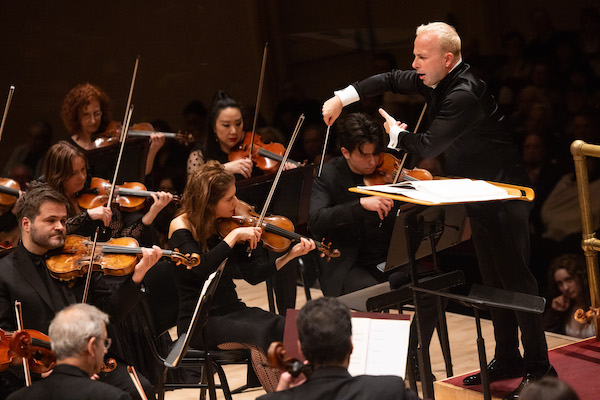Met Opera Orchestra offers a mixed bag of musical Shakespeare at Carnegie

The Met Orchestra finished its season Thursday night at Carnegie Hall with a program that offered four ways of looking at Shakespeare. The headliner was Verdi, with Act IV of Otello, featuring soprano Angel Blue as Desdemona and tenor Russell Thomas as Otello, which filled the second half.
Before that came Leonard Bernstein’s Symphonic Dances from West Side Story, a world premiere by Matthew Aucoin that was related to King Lear, and the Fantasy Overture from Tchaikovsky’s Romeo and Juliet ballet. This was all stirring and affecting in the end, but the path there was often uncertain and unpromising,
Bernstein makes for a great opener, as West Side Story is a great American masterpiece and also great New York City music, with the energy, joie de vivre, and muscular grit of the city. The sound and style comes from the mix of people and cultures here, and also, to paraphrase Joni Mitchell, the subway and taxi horns and brakes. New York orchestras play it best, so Thursday’s poor performance was an unexpected disappointment.
Neither the ensemble nor conductor Yannick Nézet-Séguin seemed to have much grasp of the style of the music, or perhaps too little rehearsal went into the performance. Everything was underdone, under-thought. The rhythms in the Prologue were clear but didn’t have enough sharpness, those in the Cha-Cha had insufficient bounce; the phrasing in “Somewhere” was inexpressive; swing passages were turgid; the Mambo was a complete mess, the rhythms and phases colliding with each other. Beyond the technical issues, there was no spirit, neither that of Romeo and Juliet nor of New York itself.
The world premiere from Aucoin followed. Rather than great music poorly played, the performance appeared focused and determined, with a steady hand on the music. Unfortunately this time it was the music that was uninspired.
Titled Heath (King Lear Sketches), Aucoin’s work is a sort of landscape piece, meant to illustrated the drama of the desolate place to which Lear is banished. This does come off literally, though in a way that it is hard to imagine Aucoin intended: the music was barren, colorless, confined to a narrow dynamic range and in the bland colors of Aucoin’s usual gray orchestration.
Like the heath, this was a flat surface with few interesting features. There was a moment when it seemed to aspire to the score for a classic noir film yet despite the extroverted activity, it was expressionless, with no inherent drama. This was music pitched to English departments at Ivy League schools, where listeners could recite the lines of the play to themselves while the music soundtracked their memories.
The Romeo and Juliet Overture was an enormous contrast in how to make music that has unmistakable drama, and the performance was crisp, rich, and full of expression. That this is a famous work with unforgettable themes in no way undercuts how Tchaikovsky shaped the narrative into a piece that creates its own atmosphere and expresses both exalted and tragic feelings. On top of that, this was a thrilling performance, the orchestra in complete command and playing with both sublime gentleness and extreme intensity.
Verdi offered another contrast. Isolating Act IV from the complete opera put a spotlight on the singing of Blue and Thomas, and also on Verdi’s genius. Compared to all of the music from the first half, Verdi’s writing seemed close to minimal, almost stark. The mix of great beauty, deep emotions, and murder as expressed through small segments of woodwinds had great power, and the details of the orchestra’s playing, the colors and balances, were marvelous.

As was Blue. Supported by the fine mezzo-soprano Deborah Nansteel as Emilia, the soprano sang the Willow Song and the following Ave Maria with tremendous grace and a focus on articulating the rise and fall of Verdi’s phrases. Rather than emote, she was a vessel for the uncanny emotions in the music itself, and the effect was ravishing. The performance had to pause for a long ovation from the audience, during which Nézet-Séguin grasped her hand in thanks and appreciation.
There’s much less music for Otello in this act, and Thomas nailed it all with an exciting intensity, there was a real sense of both threat and then anguish in his singing. The brief quartet of men, with baritone Michael Chioldi, was punchy, and at the last note, one fully felt the drama and tragedy.
The National Youth Orchestra of the United States, violinist Gil Shaham, and conductor Andrew Davis play Valerie Coleman, Barber, and Berlioz, 8 p.m., July 14. carnegiehall.org
Posted Jun 26, 2023 at 4:55 pm by Giuseppe
Another FAIL for YANNICK. I will not subscribe or return to the MET until he is gone. He is a complete mediocrity. Also, with him it’s agenda first music second.
Many of my Philadelphia friends have told me his tenure there has been a disaster. Of course, his know-nothing fans continue to praise him for all the wrong reasons.